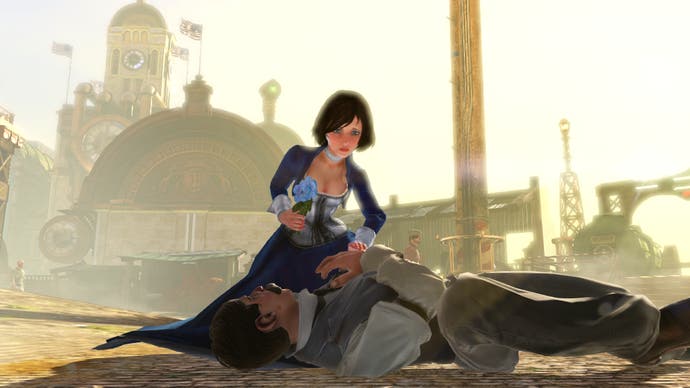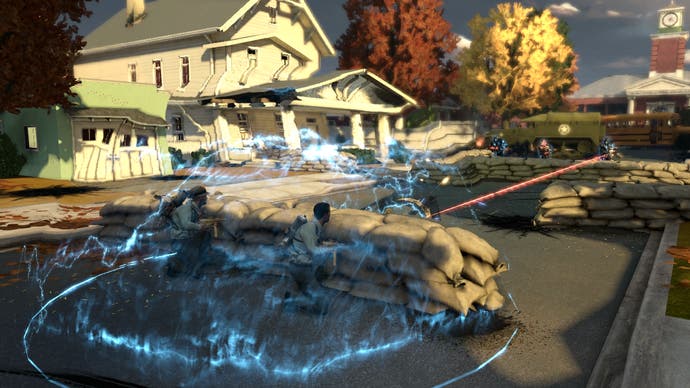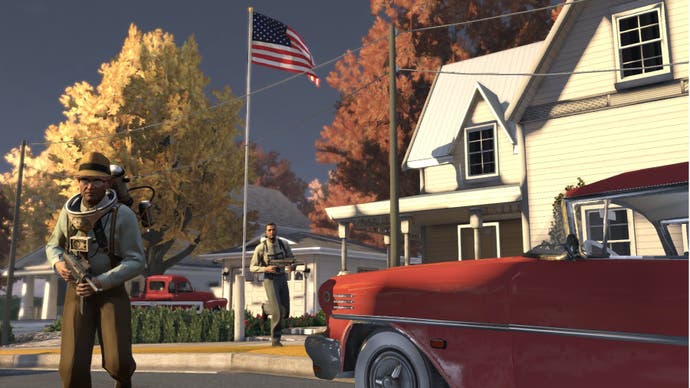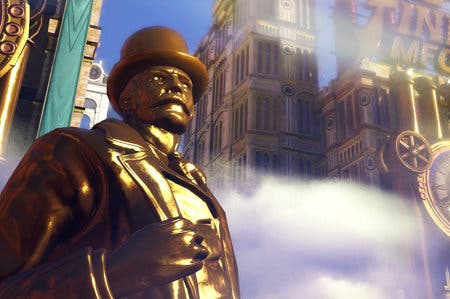Fear of Failure
Partying like it's 1999.
It says something about modern games that BioShock Infinite has been able to make headlines by adding a special "1999 Mode" where your in-game decisions will actually matter. If you've yet to hear about it, you can read our full run-down here, but in summary, it's a special difficulty mode where you'll be forced to make and live with your in-game choices. Where normally you'll be able to jack-of-all-trades your way through most situations, here - supposedly - everything will be a trade-off.
In short, it's being set up as a mode that's not afraid to let you fail - and that's practically unheard of these days. Sure, there are a few hold-outs like Dark Souls and indie games like Super Meat Boy/The Binding of Isaac that are willing to kick you in the face, but in your average AAA game? Forget it. These days, the worst we face is replaying a single fight a few times, or being irritated by a short walk back from a checkpoint. On the surface that might seem like a good thing, and in many cases it unquestionably is. Nobody enjoys failing miserably, especially when it only comes after hours of fighting impossible odds. We play games to win. Failure is a deeply bitter thing to swallow. But then, so is lemon pepper, and any cook can tell you how much a quick sprinkle can jazz up an otherwise bland meal.
If victory is assured, victory is meaningless. If you're never pushed, you never have an incentive to dig deep into a game's mechanics and make them work for you, whether it's figuring out a trick to confuse the AI or learning to love your stealth options instead of relying on brute force.

That said, BioShock Infinite is unlikely to be failure's best ambassador. Its return to old ways are specifically being pitched as a super-hard mode, and there are reasons that the things it's bringing back were dialed-down and allowed to die out. The biggest is that unless you know exactly what's coming later in the game, any decisions you make are inherently gambles, not tactics.
If later enemies can ignore your stealth build, if the pistol isn't good enough against the final boss, you're screwed in a way that's really not your fault and therefore not much fun. It's incredibly unlikely that Irrational will pull an Alpha Protocol here, but once bitten, twice glad to at least have the option to roll again. A handful of key, but non-game dooming choices in the main campaign should be enough to satisfy the itch to experiment, without ever landing you in more trouble than you can get out of. For a game like BioShock Infinite, that's how it should be.
But what of its sister/step-sister X-COM games?
The original UFO: Enemy Unknown - coincidentally set, though not released in 1999 - was practically Failure: The Game, giving you the impossible task of defending a whole planet from an alien force you were desperately unprepared to handle. The sheer scale of the challenge, from building bases to intercepting UFOs to developing a life-long fear of Chryssalids, all meant you spent at least the first two-thirds of the game balanced on a knife-edge. Failure was inevitable. Even if X-COM prevailed, you'd lose many good men in the fight. That you'd spent so long developing them, kitting them out, and even naming them after friends all made that fact so much harsher. Victory wasn't assured. It was a fantasy.
And then, suddenly, one single moment forever burns the X-COM experience into the warmest part of your brain - the first time you feel the balance of power start to shift. In an instant, your reverse-engineered weapons become a match for anything the aliens can throw at you. With psychic powers, your soldiers become powerful enough to turn theirs into mere puppets. Your bases… no, your empire stretches out from one single, solitary outpost into a world-wide alien-busting network that makes the Men In Black look like investment bankers on a lunch-break.

It's one of gaming's hardest earned victories, paid for in blood and sweat, and made perfect when you finally get to go on the offensive and make those little grey bastards eat their own anal probes for breakfast. Metaphorically speaking, of course.
All the failures are in service of that moment - they're there to make it meaningful. Will the new games dare to offer anything similar? There's no excuse for Firaxis' strategy reboot not to, even if it does dull the pain a little in the name of a wider audience. The FPS? It's unlikely, and not without cause. "Fine! This time I'll try starting with two bases!" is a very different thing to "You mean I have to replay this whole thing?" - especially with it due to focus more on story than emergence.
Not all interesting failure has to come from the threat of a Game Over. Narrative driven games have a whole bag of tricks to play with - not least, bluffing. In Heavy Rain for example, you're led to believe that the characters could die at any time and that everything you do has consequences. In practice, it's very difficult to kill any of them for most of the story, or even screw anything big up.
Likewise, whatever your feelings about Mass Effect 2's suicide mission itself, there's no arguing that the shadow it casts over your first run through the game makes your big decisions feel more meaningful. Most games have been unwilling to go this far, preferring to spend their effort on alternate moral paths instead. but few of the ones that did have ended up regretting it.

The key to making failure work is simple, yet incredibly easy to screw up - if you don't feel responsible, it's not your fault. Very rarely will anyone take the time to feel bad about failing an escort mission instead of complaining about bad AI. X-COM handled this by making absolutely everything in the world your responsibility, as (we assume) will its sequel.
Why should we want these opportunities to screw up? Put simply, the more games we get that embrace adversity, the more we'll assume that our decisions and successes will matter, and thus the more heroic our acts of heroism will be.
Raw challenge can play a part in that, as with BioShock Infinite and the original X-COM, but as Mass Effect 2 and Heavy Rain and many other games and moments prove, making you want to smash your controller is far from essential to the effect. Tension, hard decisions and the satisfaction of beating the odds are things we can all enjoy though, and much too important to either be demoted to mere unlockables, or left to be forgotten back in 1999.

